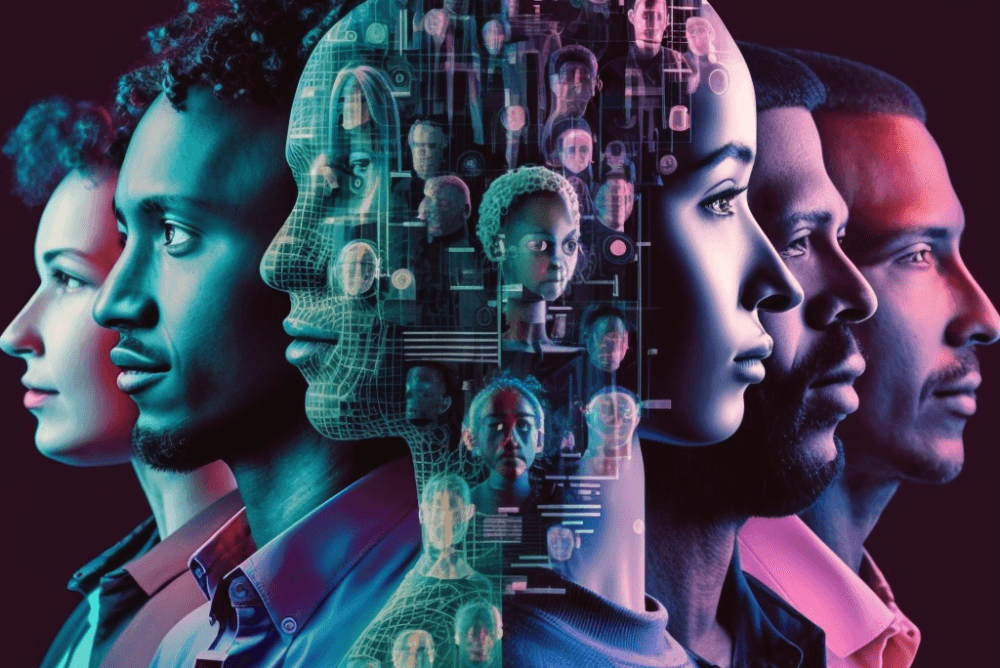The future of media: 5 experts weigh in on the impact of AI
24 Apr 2023
We asked practitioners what they think about the future of media as it relates to AI (image generated by Midjourney)
Written by Joanna Kocik, content specialist at Autentika
Generative AI has caught the attention of those in the media. But not everyone understands why AI is so valuable and why we are seeing a growing enthusiasm for its implementation. To help clarify the picture, we asked five experts who have been working with AI for years for their key takeaways from recent developments.
Media companies have been experimenting with using AI to support and produce journalistic features for some time. But since the launch of the latest version of ChatGPT in November 2022, journalists have fiercely debated its potential impact on the news industry.
"Will AI replace them at work?" "Is automation always better than human labour?" "What are possible scenarios for the next 6-12 months regarding further development of AI?"
We have already answered some of these questions in this article, where we looked at media professionals' doubts about introducing AI in their newsrooms. Now, we decided to ask practitioners what they think about the future of media as it relates to AI. Here's what five of them: Charlie Beckett, Aimee Rinehart, Ezra Eeman, Sascha Devigne, and Dennis Dirdjaja told us.
Charlie Beckett: AI won't change the nature of journalism
Charlie Beckett is a professor in the Department of Media and Communication at LSE and founding director of Polis, the London School of Economics International Journalism Institute. Charlie has spent the last five years researching how artificial intelligence transforms journalism worldwide, enabling news media to gather, create and distribute content more efficiently.
He believes the nature of journalism will stay the same, despite the influence of artificial intelligence.
"The basic idea of journalism is to provide up-to-date information in a way people can access and understand. That's an exceptional skill and in high demand these days. I last worked as a journalist 17 years ago, but I could walk into any newsroom today, and within a few days, I'd be a productive journalist again. I'd have to learn how to shoot vertical videos and TikToks, but that's a matter of an afternoon," Charlie says.
He also points out that despite rapid technological advances, people will always look for relationships with people rather than machines.
"People subscribe to a newspaper because they identify with it and believe it shares their values. And that's a relationship with a human being behind that medium – not a relationship with an algorithm. Of course, media publishers can use technology to support that relationship. We've seen that with social media: We love technology, but we love it because it allows us to do social and creative things," Charlie concludes.

Charlie Beckett, professor in the Department of Media and Communication at LSE and founding director of Polis, the London School of Economics International Journalism Institute.
Aimee Rinehart: The next year will be great for experimenting with AI
Aimee Rinehart is the program manager for the Associated Press' Local News AI initiative. Before joining AP, she was deputy director of First Draft's New York Bureau, helping journalists and newsrooms identify, verify and responsibly report misinformation and disinformation in the 2018 and 2020 U.S. election cycles.
"AI has tremendous potential to build capacity for newsrooms, especially smaller newsrooms facing staff shortages or looking to expand their coverage. AI can significantly reduce the cost of publishing news, and fierce competition between tech giants like Meta, Google, or OpenAI will lead to price reductions in AI-powered tools. For this reason, the next 6-12 months will be a wonderful time for people experimenting with AI, as tests will likely be very cost-effective," says Aimee.
She also points out that AI will complement or enhance the work of journalists – but it will not replace it.
"I hope that journalists will find innovative and creative ways to use technology that may be different from how they have been working but will deliver the same great, and in some cases even better, results. This will allow them to cast a wider net for their reporting," concludes Aimee.

Aimee Rinehart, the program manager for the Associated Press' AI Local News AI initiative.
Ezra Eeman: Include journalists in the discussion about AI
Ezra Eeman is Change Director at Mediahuis, one of the leading media groups in Belgium, Germany, the Netherlands, Luxembourg and Ireland, with over 40 national and regional news brands. Mediahuis has already worked with several AI solutions, such as text-to-speech automation for audio versions of articles and natural language mechanisms that help detect gender bias.
"AI has already arrived in the newsroom," notes Ezra, "and we now need guidelines on when and how to use it. Can journalists use it to spell check? To detect bias? Can it make suggestions for headlines? AI has many applications besides content creation, about which many editors are concerned. First, automated articles always sound generic, and second, they raise ethical questions. I think no editor-in-chief will want to take full responsibility for the end result if the content is delivered by AI," Ezra adds.
Eeman anticipates that future AI development will bring more regulations and guidelines. At the same time, more proprietary models are likely to emerge, with companies incorporating their data to create more specific and targeted models.
"AI applications will be stacked and interconnected, so we can soon expect to see machines talking to each other and taking over tasks for other applications," says Ezra. "However, if someone wants to bring AI closer to the newsroom, making journalists a part of this discussion is crucial," Ezra notes.

Ezra Eeman is Change Director at Mediahuis, one of the leading media groups in Belgium, Germany, the Netherlands, Luxembourg and Ireland.
Sascha Devigne: We should embrace technology and use it the right way
Sascha Devigne is editor-in-chief of STUDIO 47, a private regional television station for the western Ruhr region and the Lower Rhine, based in Duisburg, Germany. His team recently launched its AI-based product called BotCast – a solution that automates the production of newscasts for the daily TV news and significantly reduces the time required to do so. Several other media companies in Germany have already bought a licence to use BotCast, and more are expected to follow later this year.
"BotCast has freed our journalists from repetitive tasks, so they can now focus more on things that better fit their work. It's been the best thing that's happened to us in the last few years, and it shows that using AI in journalism (in the right way) will be a big leap forward," explains Sascha.
He also emphasises that AI is one of the few chances to secure the existence of local and regional media in the future.
"The economic situation is impacting many regional and local media companies looking for cost optimisation. And since AI and automation can be a great way to cut costs without losing quality, we shouldn't fear them. We should embrace it and make the best use of it in our editorial work.
Of course, it's best if we have it in our own hands: That's why it's vital that BotCast was developed by journalists. But the truth is that journalists have always used some kind of technology to produce content. Is the use of AI in the daily journalistic routine different from the use of other technologies and devices?" asks Sascha.

Sascha Devigne, editor-in-chief of STUDIO 47, a private regional television station based in Duisburg, Germany.
Dennis Dirdjaja: We need to teach ourselves to use AI effectively
Dennis Dirdjaja is the Director of Operations at Spektrum der Wissenschaft – a German-based publisher that includes several scientific journals and online newspapers providing the latest scientific news in physics, biology, chemistry, geology, medicine, archaeology, mathematics, astronomy, and ecology. For some time, Spektrum has used AI in various ways: in social media news distribution, translation, and predicting trending topics.
"We're always looking to try new things and explore new possibilities," Dennis says. He points out that automation and AI-powered tools help media save time and money and optimise how they reach different audiences through different channels.
"I had no doubts about using AI, and to those who are still hesitant, I can say that generative AI is like a small child – it can only get better if we engage with it and teach it. To do this, we have to give input, get output, and give feedback - that's the only way AI gets better. If you find that an AI isn't producing good results, don't give up because it won't evolve," Dennis explains.
He points out that we're in the driver's seat when it comes to AI tools. "It's not something that's completely out of control. If we teach it right, it can be an excellent help to journalists," Dennis says.

Dennis Dirdjaja is the Director of Operations at Spektrum der Wissenschaft.
AI concepts worth attention
We have been exploring various automation and AI mechanisms that can make journalists’ lives easier for quite some time. If you want to read more about them, check out this article and see how AI works in practice.



